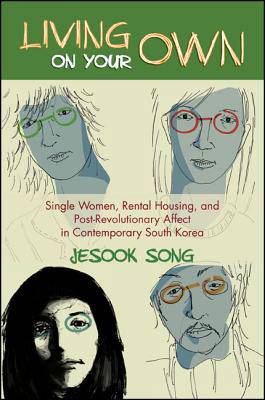
Door een staking bij bpost kan je online bestelling op dit moment iets langer onderweg zijn dan voorzien. Dringend iets nodig? Onze winkels ontvangen jou met open armen!
- Afhalen na 1 uur in een winkel met voorraad
- Gratis thuislevering in België vanaf € 30
- Ruim aanbod met 7 miljoen producten
Door een staking bij bpost kan je online bestelling op dit moment iets langer onderweg zijn dan voorzien. Dringend iets nodig? Onze winkels ontvangen jou met open armen!
- Afhalen na 1 uur in een winkel met voorraad
- Gratis thuislevering in België vanaf € 30
- Ruim aanbod met 7 miljoen producten
Zoeken
Living on Your Own
Single Women, Rental Housing, and Post-Revolutionary Affect in Contemporary South Korea
Jesook Song
Hardcover | Engels
€ 151,45
+ 302 punten
Uitvoering
Omschrijving
Living on Your Own is an ethnography of young, single women in South Korea who seek to live independently. Using extensive interviews, along with media analysis and archival research, Jesook Song traces the women's difficulties in achieving residential autonomy. Song exposes the clash between the women's burgeoning desire for independent lives and the ongoing incursion of traditional, conservative family ideology and marriage pressure into housing practices and financial institutions. She pays particular attention to the Korean rent system and the reliance on lump-sum cash even for basic subsistence, which promotes tight control of young adults' lives by family and kinship networks. The young women whose voices feature prominently in this book are a prototype of global youth in crisis: caught between aspirations for the self-development and flexible lifestyle championed by globalizing media and communication technology and the reality of their position as flexible labor in a neoliberal economy.
Specificaties
Betrokkenen
- Auteur(s):
- Uitgeverij:
Inhoud
- Aantal bladzijden:
- 164
- Taal:
- Engels
Eigenschappen
- Productcode (EAN):
- 9781438450131
- Verschijningsdatum:
- 1/04/2014
- Uitvoering:
- Hardcover
- Formaat:
- Genaaid
- Afmetingen:
- 160 mm x 236 mm
- Gewicht:
- 408 g

Alleen bij Standaard Boekhandel
+ 302 punten op je klantenkaart van Standaard Boekhandel
Beoordelingen
We publiceren alleen reviews die voldoen aan de voorwaarden voor reviews. Bekijk onze voorwaarden voor reviews.











